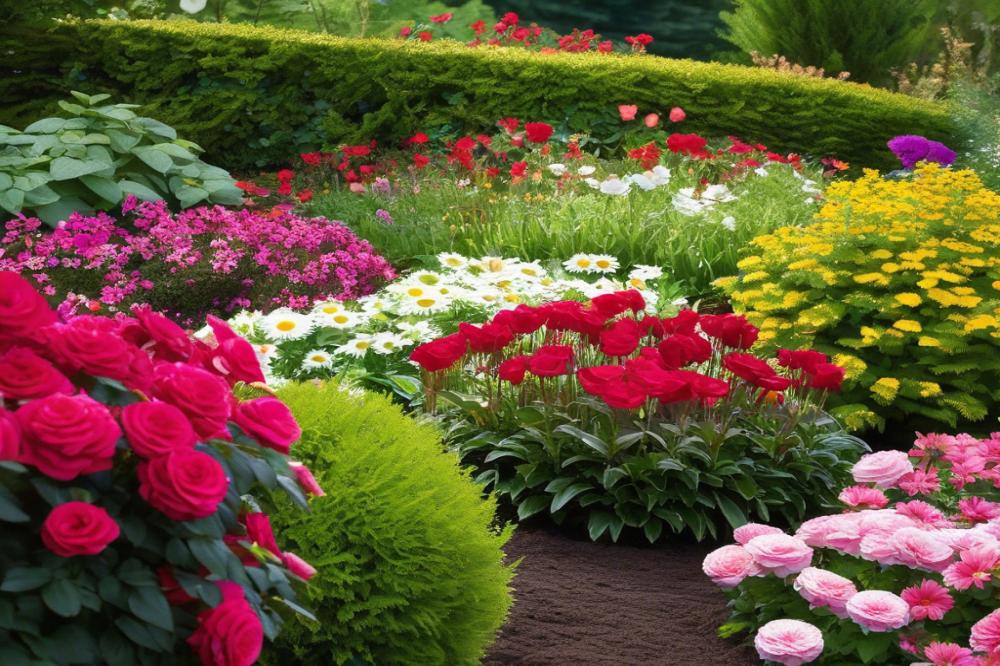The Importance of mulching in flower garden care
mulching involves covering the soil around plants with a layer of material. This practice plays a vital role in flower garden care. Maintaining a healthy flower garden is essential for vibrant blooms and robust plant growth. A well-cared-for garden can be a source of joy and beauty for anyone who tends it.
Several primary benefits of this practice cannot be overlooked. One of the most significant advantages is moisture retention. A good layer of mulch helps keep the soil hydrated, reducing the need for frequent watering. This is particularly important during hot summer months when plants may suffer from dehydration.
Weed control is another compelling reason to use mulch. Weeds can compete with flowers for nutrients and space, often choking out the delicate plants you want to flourish. By blocking sunlight, mulch inhibits the growth of weeds, making garden maintenance easier and more efficient.
Furthermore, mulch contributes to improved soil health. Over time, organic mulch can break down and enrich the soil with essential nutrients. This process supports beneficial microorganisms that foster robust ecosystems beneath the surface, which in turn promotes healthy plant growth.
Using decorative mulch not only serves functional purposes but also enhances the visual appeal of your garden. A thoughtfully chosen mulch material can complement the colors of the flowers and create a harmonious landscape. Such aesthetic considerations are especially important in seasonal gardening, where each bloom plays a role in the overall design.
Lastly, the environmental impact of mulching is noteworthy. This method can reduce the need for chemical herbicides and fertilizers, thus supporting a more sustainable approach to gardening. Utilizing organic mulch, such as wood chips or straw, contributes to a healthier ecosystem.
In conclusion, understanding the role of mulch in flower gardens is crucial for any gardener. Its numerous benefits range from practical aspects like moisture retention and weed control to improvements in soil health and environmental sustainability. By incorporating this technique, anyone can enjoy a vibrant and thriving flower garden.
Understanding Mulching
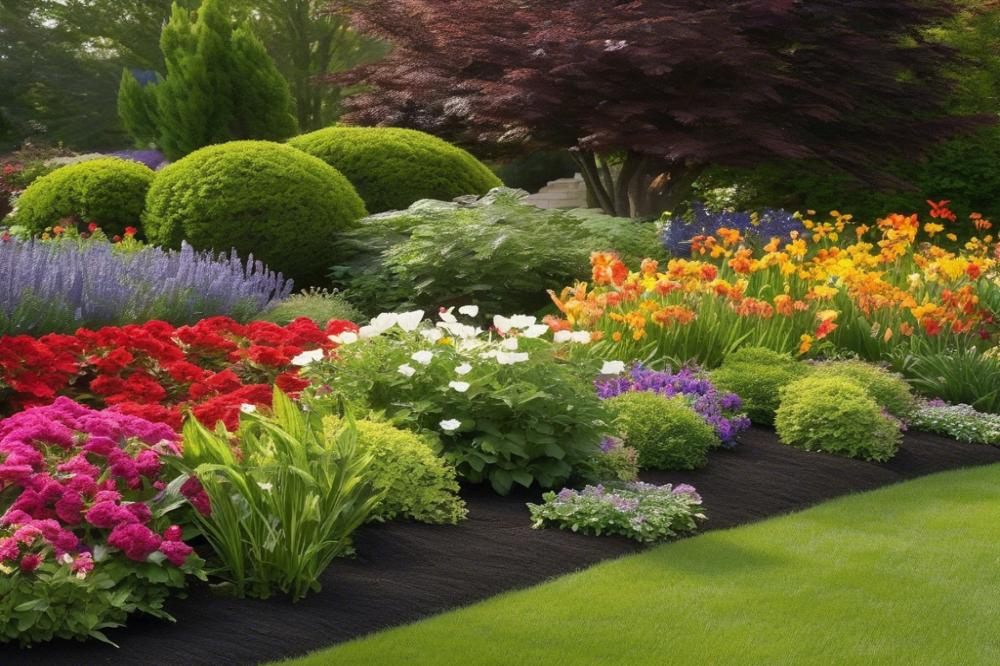

Mulching is a technique used in gardens to cover the soil around plants. This layer can be made from various materials. Common options include wood chips, straw, grass clippings, and even decorative stones. Each type of mulch serves specific purposes, and understanding these can help you improve your flower garden.
Organic mulch is made from natural materials that decompose over time. This includes items like bark mulch and shredded leaves. As these materials break down, they enrich the soil, promoting soil health. Decorative mulch, on the other hand, is often used more for aesthetic purposes than for improving plant growth. It may consist of colored stones or synthetic materials, adding beauty but not necessarily enhancing the ground beneath it.
In seasonal gardening, applying mulch is a critical task. During spring, it can help keep soil moist as warmer temperatures arrive. This ensures that plants have enough hydration as they begin to bloom. In the summer, a fresh layer can prevent weeds from sprouting. Blocking sunlight from reaching the soil helps control these unwanted plants. Additionally, mulch can cool the soil, protecting root systems from extreme heat.
As the seasons change, so do the reasons for mulching. In fall, a thick layer can protect plant roots from winter freezes. It acts as an insulator, maintaining consistent temperatures. This action truly supports plant life during the harsh months. Each type of mulch plays a role in tackling garden maintenance effectively, benefiting both aesthetics and practicality.
Understanding the environmental impact of your choices is also essential. Using organic options supports wildlife and ecosystems. Decomposing materials attract beneficial insects and earthworms. These organisms help improve soil fertility and structure. By selecting the right type of mulch, you not only care for your plants but also contribute positively to the environment around your garden.
benefits of mulching
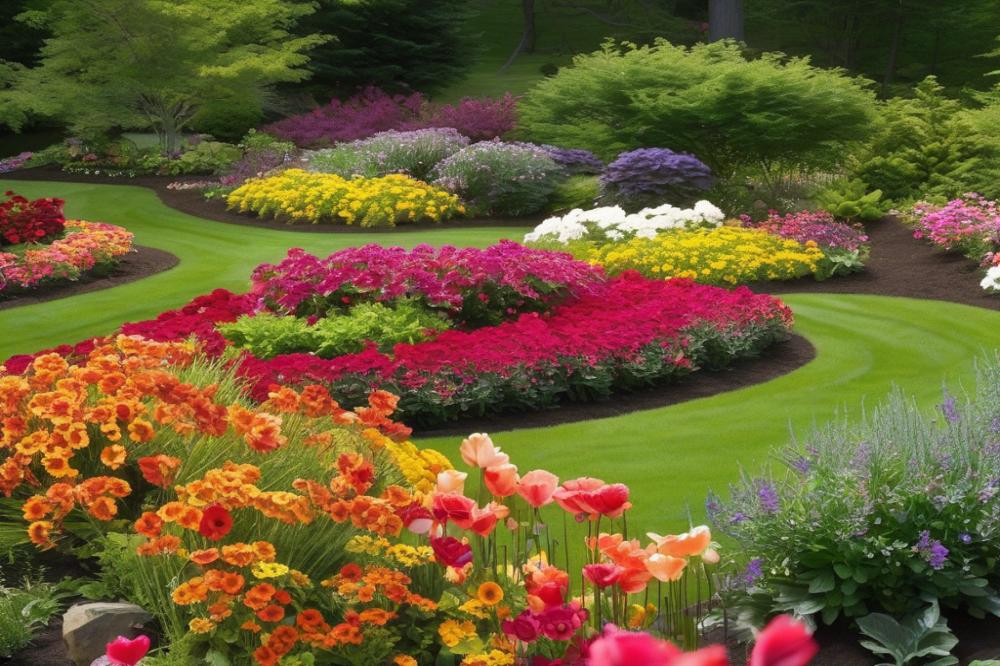

Mulching offers numerous advantages for flower gardens. One primary benefit is moisture retention. A layer of organic mulch helps keep the soil moist by slowing evaporation. This is particularly helpful during hot, dry spells. Consistent soil moisture levels promote healthy plant growth.
Another significant advantage lies in weed control. A thick layer of mulch can smother weeds. This reduces competition for nutrients and sunlight. Less competition means your flowers have a better chance to thrive. Weeds can quickly take over a garden. Using mulch can save time spent on garden maintenance.
Soil health also improves with mulch. Organic types break down over time. This adds vital nutrients back into the soil. Healthy soil supports robust root systems, which is essential for strong plants. When soil is well-nourished, flowers can better withstand pests and diseases.
Different types of mulch can add beauty to the garden too. Decorative mulch not only serves practical purposes but enhances the overall look. It creates a polished appearance around your plants. Seasonal gardening becomes easier with an attractive layout.
The overall environmental impact of using mulch can be significant. Mulch protects soil from erosion and compaction. It helps maintain a balanced ecosystem in your garden. A well-maintained garden becomes a sanctuary for beneficial insects and birds.
In summary, the benefits of using a good layer of mulch are clear. It aids in moisture retention, offers a means of weed control, and boosts soil health. These aspects collectively contribute to flourishing plant growth, making it an essential practice for any flower garden enthusiast.
Choosing the Right Mulch
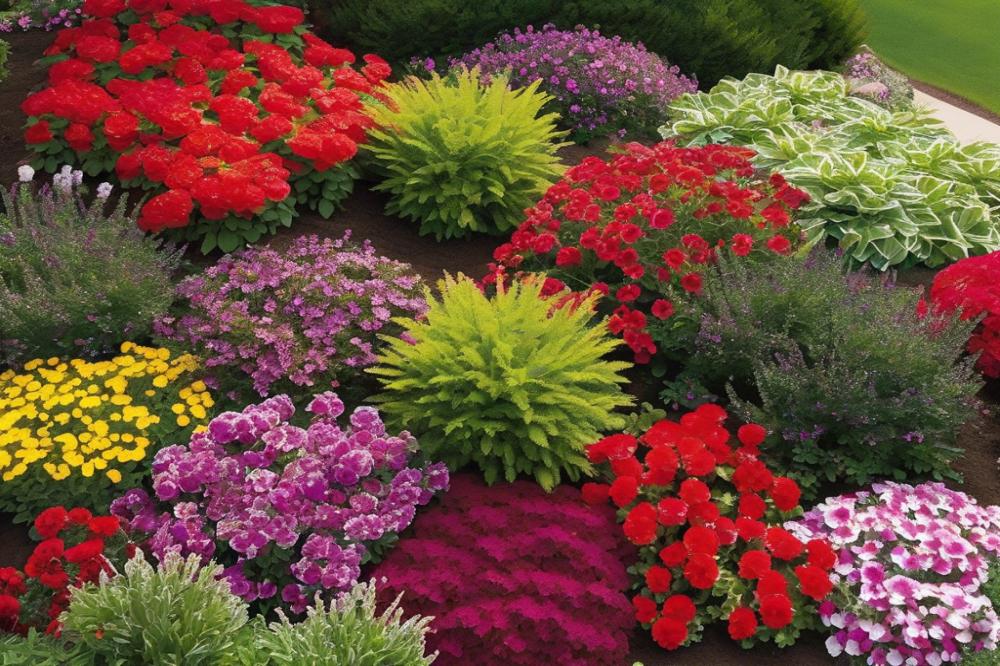

When selecting the right mulch for your flower garden, it’s essential to understand the types available. Organic mulches are those derived from natural materials. Common options include shredded bark, straw, grass clippings, and wood chips. These materials break down over time, enriching the soil and promoting healthy plant growth.
Decorative mulches serve a different purpose. They add aesthetic appeal while also offering some benefits, like moisture retention and weed control. Some popular decorative choices are colored rubber mulch, pebbles, or gravel. These options can create a vibrant appearance around your flowers while still helping with garden maintenance.
Guidelines for Selection
Choosing mulch should depend on the specific flower species and the conditions of your garden. Think about the plants you have. Some flowers, like roses, thrive with organic mulch, which supports soil health. Other more drought-resistant species might do well with decorative materials that prevent soil erosion and help maintain moisture.
Texture plays a crucial role in mulch selection. Coarse materials like wood chips provide good aeration and can discourage weeds. Conversely, finer mulches such as shredded leaves can retain more moisture, benefitting delicate flowers. Always consider how the mulch feels and looks. It should align with your garden’s overall design and the plants’ requirements.
Color and Nutrient Content
Colors can enhance visual appeal. Darker mulches can make bright flower colors pop, while lighter options can create a calm effect. Consider the seasonal gardening aspect when choosing colors to ensure they remain appealing throughout the year.
Nutrient content is vital as well. Organic options are generally best for enriching the soil. As they decompose, they release essential nutrients. For nutrient-focused gardens, choose a mulch that contributes positively to the surrounding environment rather than just serving a decorative purpose.
Ultimately, your choices may impact your garden’s overall health and appearance. The benefits of mulching extend beyond aesthetics, including environmental impacts such as reduced water usage and better soil quality. By considering these factors, you can create a flowering garden that thrives.
Techniques for Effective Mulching
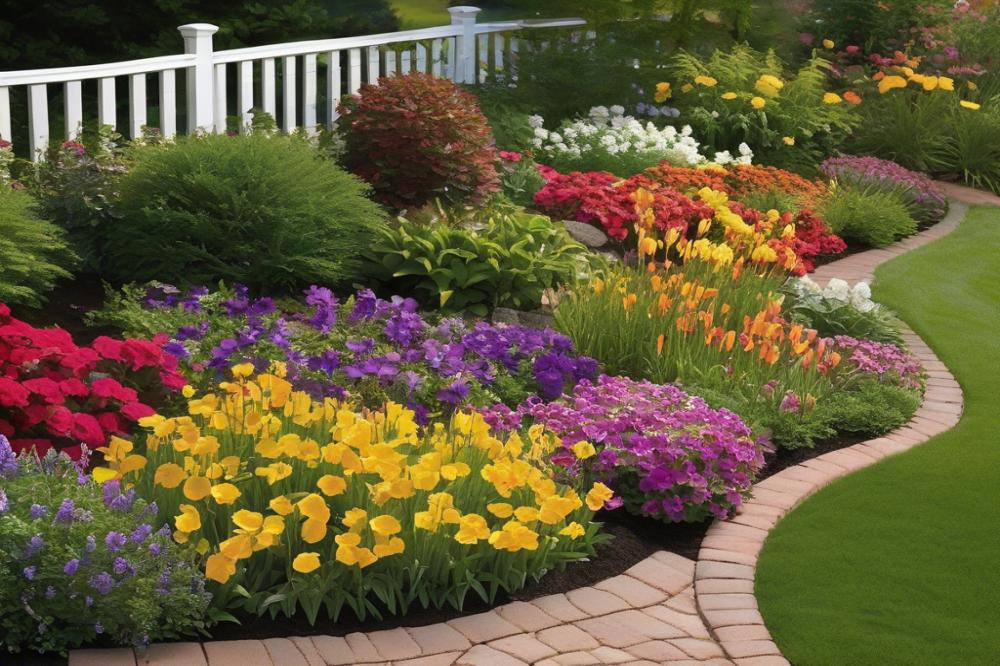

Mulching is a vital practice in flower garden care. Applying mulch correctly can transform your garden’s health. Start with the right depth. A thickness of two to four inches is ideal for most flower gardens. This layer helps in moisture retention and reduces evaporation from the soil. Too much mulch can suffocate plants, while too little may not keep weeds at bay.
Timing is just as important. Consider laying down mulch in early spring or late fall. Early spring provides warmth and protection as plants begin to grow. If you wait until late fall, the mulch can help insulate the soil during colder months. Both seasons can enhance plant growth significantly.
Placement matters too. Spread mulch evenly around plants, but keep it away from stems. If mulch presses against the plant, it can lead to rot. Maintaining a gap of about two inches is often best. This practice protects your flowers while allowing them to breathe.
Different types of mulch offer unique benefits. Organic mulch, like bark or straw, enriches the soil as it breaks down. Decorative mulch adds an aesthetic touch, making the garden visually appealing. Choosing the right kind not only enhances beauty but also contributes to soil health.
Throughout the seasons, regular maintenance is crucial. Check the mulch layer periodically. Top it off as needed to maintain the recommended depth. Over time, organic materials decompose, so replenishing them can improve nutrient content. Keeping an eye on weeds will also save you effort. Eliminating them regularly helps protect your flowers.
Consider the environmental impact of your choices. Using natural or locally sourced materials reduces the carbon footprint. Sourcing mulch responsibly supports sustainable gardening practices. Making informed decisions contributes to your garden’s overall ecosystem.
In summary, effective mulching involves attention to depth, timing, and proper placement. Regular maintenance ensures your flower garden thrives season after season. Each element plays a role in supporting the health and beauty of your plants.
Environmental Impact of Mulching
Using mulch in flower gardens provides numerous environmental benefits. This practice promotes biodiversity by creating a habitat for various organisms. Insects, birds, and beneficial microbes thrive in these rich environments. Such diversity plays a crucial role in maintaining a balanced ecosystem.
Local ecosystems benefit greatly from the layers of organic materials. When mulched, gardens become attractive to pollinators. Bees and butterflies are more likely to visit, ensuring that plants can reproduce effectively. Additionally, the presence of diverse plant life supports the food web in the area.
Moisture retention is another key advantage of this gardening method. A layer of material on the soil surface helps keep moisture from evaporating quickly. With less water needing to be applied, gardeners can reduce their water usage. This conservation is especially important in regions prone to drought.
Overall, soil health improves when using organic mulch. As it breaks down, it enriches the soil with nutrients. Healthy soil promotes strong plant growth, resulting in robust flowers. Plants gain the added advantage of being better equipped to resist pests and diseases.
Weed control is simplified with this technique. A thick layer stops most weeds from sprouting, which reduces the need for herbicides. Less chemical use is better for the environment and local wildlife. By avoiding harmful substances, gardeners help protect sensitive species.
Decorative mulch also adds visual appeal to gardens. Choosing vibrant or textured materials enhances the beauty of flowers. Seasonal gardening becomes more enjoyable when landscapes are pleasing to the eye. An attractive garden can bring a sense of peace and joy to anyone who visits.
Using sustainable materials for mulch is essential. Recycled yard waste or local resources minimize the carbon footprint. Ensuring that products are sourced responsibly helps maintain healthy ecosystems. Being aware of these choices encourages responsible gardening practices that have a positive environmental impact.
Final Thoughts on Mulching in Flower Gardens
As we wrap up our discussion, it’s clear that incorporating a layer of organic material in your flower garden provides numerous advantages. A well-managed layer protects against weeds and keeps the soil moist. In addition, it can regulate soil temperature, which helps plants thrive. The benefits of mulching extend beyond just appearance; they contribute to overall health.
Garden maintenance becomes much simpler when you adopt this strategy. Regularly applying mulch not only saves time but also reduces the need for constant watering. So you can spend less time worrying and more time enjoying your blooms. Furthermore, as it breaks down, organic material enriches the soil by adding essential nutrients.
Ultimately, every gardener should consider this practice a fundamental part of caring for their flower beds. Healthy, vibrant gardens do not happen by chance. Take a step towards a more beautiful garden by mulching. Embrace this simple yet effective technique, and watch your flowers flourish.

